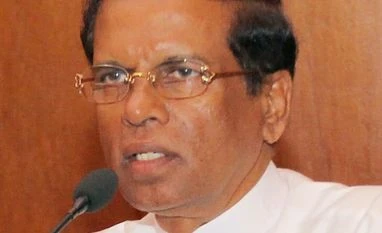Sri Lankan media has described the dramatic move of President Maithripala Sirisena to sack Prime Minister Ranil Wickremesinghe and appoint former strongman Mahinda Rajapaksa as his successor Friday night as a "constitutional coup".
The sudden political development came amid growing tensions between Sirisena and Wickremesinghe on several policy matters and the President has been critical of the Prime Minister and his policies, especially on economy and security.
Reacting sharply to his sacking, Wickremesinghe asserted that the swearing in of Rajapaksa in his place is "illegal and unconstitutional" and he will prove his majority in Parliament.
The Sunday Morning English weekly opinion column screamed 'Paradise Lost? preliminary notes of constitutional coup'.
"The whole set of circumstances suggest not the way a change of government ought to occur a democracy, but the sharp practices associated with a constitutional coup, which is likely to lead to a constitutional crisis," it said.
"It is a constitutional coup because the serving Prime Minister has not legally ceased to function in office before a new Prime Minister has been appointed," it added.
More From This Section
The Sunday Times wrote that the Sirisena-Rajapaksa deal had been kept a top secret and even Sirisena's loyalists were not aware until Rajapaksa was sworn in as the prime minister.
"The Cat is out of the bag with the prorogation (suspension) of parliament till November 16. It clearly means the present has been advised to create a fait accompli situation which gives the new PM bargaining power with his new office to negotiate with MPs," the paper said in an editorial.
The papers have chosen not to refer to Wickremesinghe as the former prime minister in view of the ongoing lack of clarity on the legality of Rajapaksa's appointment.
The Sunday Island editorial captioned 'Constitutional Coup' said, "Friday night's stunning developments that caught not just the country but the UNP faction of the ruling cabal by surprise suggests that Sri Lanka, at the time of writing, is confronted by a seemingly anarchic situation of two prime ministers claiming office."
Meanwhile, Security was beefed up in the capital city Sunday morning.
The Army, police and the special task force have been deployed around the presidential secretariat with soldiers being seen on streets near important installations.
Ousted prime minister Wickremesinghe remained in the prime minister's official residence-cum-office of Temple Trees. The government sources said that they would obtain a court order to evict Wickremesinghe from Temple Trees.
The UNP said Wickremesinghe's ouster was illegal and he would operate from there until the parliament is convened and a floor test established he would still be the prime minister.
The UNP MPs had begun to sign a resolution extending support to Wickremesinghe to prove his parliamentary majority and call for immediate reconvening of parliament after Sirisena suspended it until November 16.
"We would be conducting a protest march on Tuesday in Colombo against the president's unconstitutional action," a UNP legislator said.
The sources, close to Sirisena, said a new Cabinet would be sworn in by Monday which would be restricted under 30 members. The government has sent circulars to all state institutions that the previous Cabinet has now been dissolved.
Sirisena and Wickremesinghe had joined to form a government of national unity in 2015 to bring in constitutional and governance reforms including a new constitution to address the long-standing issues if the Tamil minority.
Rajapaksa's return to power ends a more than three-year-old coalition government that was formed by Sirisena and Wickremesinghe on a promise to combat corruption and financial irregularities.
Sirisena, who was Rajapaksa's minister of health, broke away from him to contest the presidential elections.
Political analysts said Sirisena's move to install Rajapaksa as the prime minister could lead to a constitutional crisis as the 19th amendment to the Constitution would not allow the sacking of Wickremesinghe as the premier without a majority.
Rajapaksa and Sirisena combine has only 95 seats and is short of a simple majority. Wickremesinghe's UNP has 106 seats on its own with just seven short of the majority.
Early this month, it was reported that Sirisena accused his senior coalition partner the UNP of not taking seriously an alleged conspiracy to assassinate him and Gotabhaya Rajapaksa, the former top defence ministry bureaucrat and brother of ex-president Mahinda Rajapaksa.
Sri Lanka nearly faced economic sanctions from the West over Rajapakse's brutal military crackdown on the banned Liberation Tigers of Tamil Eelam (LTTE).
The LTTE sought a separate Tamil homeland in the northern and eastern provinces of the island nation for nearly 30 years before its collapse in 2009 after the Sri Lankan Army killed its supreme leader Velupillai Prabhakaran.
Rajapaksa and his family were facing several cases of corruption and financial irregularities.
)